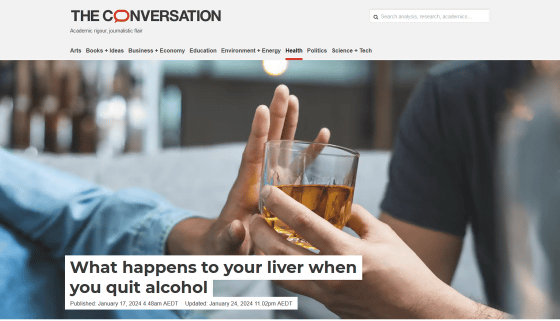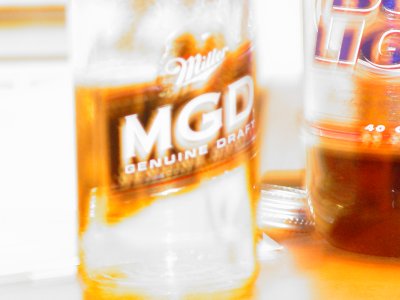In just a few weeks, quitting drinking can improve your liver health and reduce your risk of cancer and stroke.

The alcohol contained in alcohol relaxes and excites people, resulting in a pleasant ``drunk state'', but if you drink too much alcohol over a long period of time,
What happens to your liver when you quit alcohol
https://theconversation.com/what-happens-to-your-liver-when-you-quit-alcohol-220490

The liver is the largest organ in the human body, and among its many diverse functions is the breakdown of alcohol. Continuing to drink large amounts of alcohol can lead to a condition called fatty liver , where triglycerides accumulate in the liver, and if left untreated, it can cause inflammation in the liver. During the healing process of this inflammation, scar tissue is formed, causing the liver to harden and become lumpy, resulting in cirrhosis .
In the later stages of cirrhosis, the liver no longer functions properly, causing jaundice (a yellow discoloration of the skin and the whites of the eyes) , as well as swelling of the legs and ascites due to body fluids. As liver function declines, a disorder of consciousness called hepatic encephalopathy may occur, and eventually death may occur due to liver failure .
Most people regularly drink more than 14 units of alcohol per week, with 20g of pure alcohol equivalent (500ml of beer with 5% alcohol content or 180ml of wine with 14% alcohol content) being ' one unit '. pointed out that people have fatty liver.

Fatty liver disease is a dangerous sign that can eventually lead to cirrhosis and liver failure, but the good news is that in people with fatty liver disease, the liver heals and
Also, even in people with more severe scar tissue and liver failure, abstaining from alcohol for several years reduces the risk of worsening liver failure and death. However, people who drink large amounts of alcohol are physically dependent on alcohol, so if they suddenly cut their alcohol intake to zero, they may experience withdrawal symptoms such as tremors, sweating, and seizures. Therefore, Danda explains that if you drink a large amount of alcohol on a daily basis, it is better to gradually reduce your alcohol intake rather than suddenly reducing your alcohol intake to zero.

It is also known that abstaining from drinking alcohol has benefits not only for the liver, butalso for improved brain function and sleep quality, and that avoiding alcohol intake for a long period of time can lead to cancer and heart disease. The risk of illness, stroke, etc. is also reduced.
Dr. Danda says, ``If you want to take care of your liver, don't drink alcohol.However, if you must drink alcohol, keep it in moderation and set aside two to three days a week where you don't drink alcohol. 'If you do, you won't have to rely on your liver's magical self-healing powers to stay healthy.'
Related Posts:







